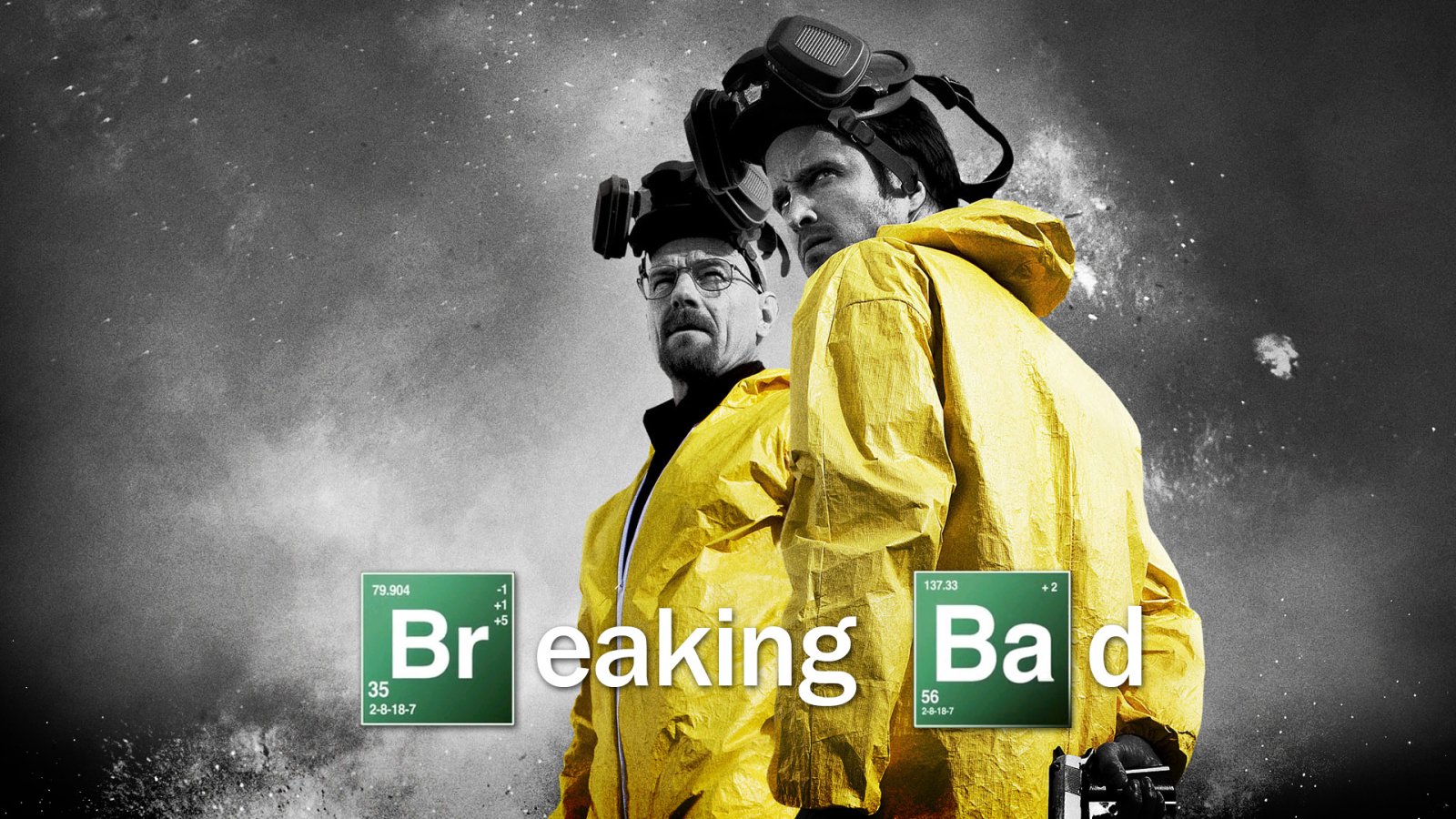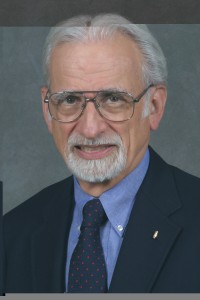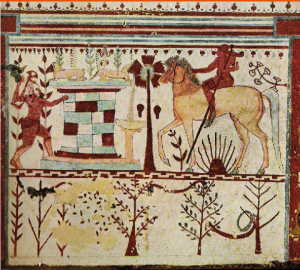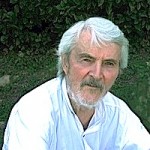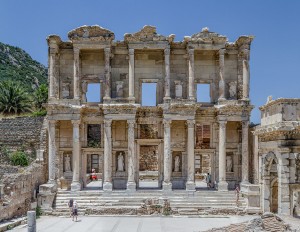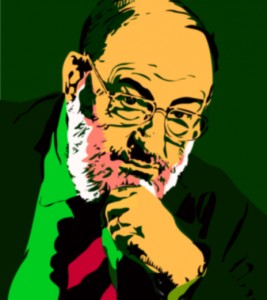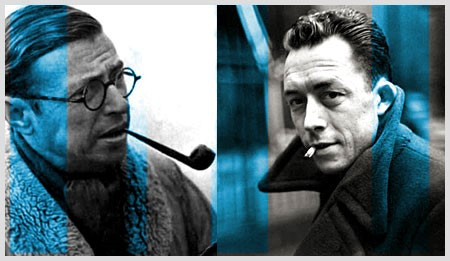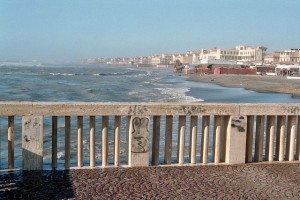
Ostia, Italy beach in winter. Courtesy Haneburger. Public Domain
=A short story By= Gaither Stewart
The flow of Andrey’s life recalled that of the uncontrollable race on a roller-coaster. From the time he boarded, his unstable little car had carried him at terrifying speeds around curves and over bumps, up, up, then hurtling straight earthwards, while he submitted, hardly holding on and showing no desire or will to get off. It seemed he was always ready to take any dare he encountered for, as he once told me, you might not ever get a second chance. Still, I never thought his search of reward was necessarily related to pleasure. Instead, he acted—I came to think over the year or so that I followed his case—in the manner he thought life dictated and in which it was supposed to be lived. In fact, if he did seek pleasure, I feel certain he didn’t recognize it when he encountered it because of his haste to live. Most certainly his life was never guided by any dominant thought whatsoever. Nonetheless, at times during the loneliness of night he must have sensed the doom of where his path was taking him for he seemed to believe that the only doom to worry about was the one he himself desired, so why try to escape it?
For that reason, I have never thought he was surprised during the few seconds of his fatal fall from the rotting drain pipe at the fifth floor to the pavement below. For him, had he known how to express his thoughts clearly he would have said it was just another of the absurdities life offers. Nor do I believe cynical Andrey would have regretted his burial in the pauper’s plot of the obscure Rome cemetery. I doubt he ever even posed to himself the question of a change of the direction of his life; in fact he seemed to accept his destiny without resistance, even with humility. He obeyed the rules of the “game”, as he often referred to his own life. I still remember how his Oriental eyes would sparkle when he blithely denied one accusation or the other or when he created another outrageous alibi or unexpectedly promised to reform his ways in exchange for some momentary gain.
That fatal night while his women and I crouched over his crushed body lying awkwardly on the pavement an enigmatic smile played at the corners of his mouth as he tried to form a Russian word which sounded like “za” or “zab” … before he closed his eyes in peaceful death. I have always believed he wanted to say the Russian word for ‘I forgot’, zabyl.
I had just graduated from Rome University in Russian studies and was doing volunteer work at a refugee agency established to deal with the flood of immigrants and refugees arriving back then from Africa and the Near East and above all from Russia. My first assignment was the difficult case of Andrey, a dirty blond, tall and lanky Russian Jew about my age, whose ardent desire was to immigrate to any European country that would have him. He justified his rejection of immigration to the United States or Israel quite simply: “I am a European and want to live my life in Europe.”
You couldn’t say that Andrey had not already begun to live his life. He lived life to the full and only infrequently did he complain about the traps and entanglements his life had reserved for him. Occasionally he expressed mild disappointment about what were relatively inconsequential problems, or he might complain to have been wronged in one way or another, but as a rule he was a man at peace with what the downward trajectory of his life meted out to him.
He told me that the only troublesome situation to be avoided at all costs was boredom. “The source of all my problems,” he admitted.
I remember being struck by two of his most positive characteristics during his first days in Rome: his unjustified optimism and his sly but friendly smile for one and all. His optimism was in reality inexplicable and his smile, I now know, a mask to cover his submissive nature.
“My father was a Korean who came to Russia after the war in the East. He and my Jewish mother were quite a colorful couple in Odessa. The school kids teased me as the Chink … and you know how Russians looked down on the Chinese. Still, it wasn’t so bad … and after I finished school there were other friends.”
Andrey smiled his sly smile and only hinted that those “other friends” had contacts abroad. Another Russian immigrant who had known him in Odessa told me that Andrey’s gang had been an unsavory lot, constantly in trouble with the police. Although Andrey had never been arrested or even charged with anything, since he had never had a regular job but had money people suspected he was involved in smuggling drugs from Turkey and Iran, a common activity for the daring in Odessa. However, since he was reluctant to take on steady work in the factory he was exposed to the charge of parasitism.
In general I liked to hear his stories about Odessa, a city which though I had never visited fascinated me. Its dramatic history, the Eizenstein film, The Battleship Potemkin that I had seen several times and those famous steps leading down to the sea created an aura of mystery and drama around the city at the north end of the Black Sea.
“As a boy we loved to play “smugglers and coastal” police in the underground tunnels and run races from top to bottom and back on the great staircase. Then as I got older I liked to meet the sailors and hear their foreign languages … and I yearned to see the rest of the world.”
“Who did you prefer to be in those games?” I asked.
“Most of the kids preferred to be cops, but I always wanted to be a smuggler. Strange, no. But I learned then how many people really want to be policemen. Everybody wants to command. But not me. I think it too difficult to be both policeman and a good man.”
“But you don’t believe someone has to control our anti-social instincts.”
Andrey chuckled. “My feeling is that we’re born free … we’re also responsible for our actions.”
Because of statements like that I always thought the best of Andrey and gave him the benefit of the many doubts he created about himself.
“But anyway the police were constantly knocking on my door for one thing or another,” he told me, intimating persecution for political reasons as a justification for his definition of himself as a political refugee. “After my father left, my mother was easily upset and afraid of everything … so it was simply time to leave the country.”
****
After all the years since then, after all our talks that seemed frank and sincere, I realize I never knew what was fact and what belonged to the realm of immigration rumors about Andrey’s real life in Odessa. Allegedly, late one night at the end of a long drinking session he had robbed and murdered a young sailor on a back street in the Old City. I never reported the story about the dead sailor to the immigration agency, which in truth was only hearsay, but I recall that when I asked Andrey for clarification he showed remarkably little interest about the “incident”—his favorite word for the ugly things of life, for the great mistakes that can determine the direction your life takes. For him such events always remained “unfortunate incidents” causing me sometimes to take my disappointment in him for the truth.
Only a few months after his arrival in Rome occurred an event that eventually accelerated the downward spiral in his game of life. Now I should underline that Andrey was not one to be easily frightened or stalemated, or even chagrined and cowed by those reoccurring gross and embarrassing situations. He made no compromises. Though that it is not to say that he was not concerned about events dangerous to his personal situation or that he neglected to undertake corrective measures. Nevertheless, his overall behavior belied his cynical, albeit sensitive nature. When I saw his somewhat distorted name in large print on page 5 of the daily IL MESSAGGERO one morning, I was really surprised that the “Russian immigrant” was in grave condition in the Fatebenefratelli Hospital, while his friend from Odessa, a certain Niederman, was dead from an overdose. The official position of the Italian authorities was so intransigent that it took my agency twenty-four hours to penetrate police omertà.
By the time I learned where Andrey was supposed to be, he had already been taken away by the Carabinieri. The upshot of the event was that his official image seemed to have been actually enhanced, chiefly as a result of his deadpan descriptions of what had occurred and the comradery of an understanding policeman.
The next day I found him miraculously recovered and sprawled comfortably on a leather chair in the Carabinieri Special Investigative Unit in Parioli where I was to interpret for his official deposition.
“I drank a lot of beer and vodka,” he explained in his most reductive manner, which the young Carabinieri officer seemed to like. “I was stinking drunk, passed out and woke up on that examination table in the hospital.”
“Doctors thought you were dying,” the policeman said nonchalantly.
“Dying?… Why should I die from too much beer? I was drunk. And in heaven’s name what is this story about drugs? They only told me today that Misha died. I had met him on the street that day and when I saw he was in bad shape I really wanted to take him home. But things got out of control. Anyway, by now that evening is pretty vague. I remember a car, and sleeping on the back seat.”
Andrey smiled his engaging laid back smile and looked so Italian I thought as he slouched lower in the chair, his long legs extending half way across the room. The young Brigadier smiled as he wrote up Andrey’s testimony, I was certain, in a positive way for Andrey, emphasizing, he told me in Italian, the absence of any trace of narcotics in his blood, and linking Andrey to the affair only as a witness. The whole thing reminded me of how Andrey’s “policemen and smuggler” games might have gone in the Odessa underground. Exonerated of all drugs charges or involvement in Niederman’s death, he was released on the spot and left with me.
The downside of the affair was that he was ruined with immigration authorities of nearly every country he had applied to, countries not about to accept such tainted characters.
So what now? I wondered. And what mischief would he be up to next? You just never know what a man on his way down is capable of … or one on his way up too fast, either.
Writing this story about Andrey years later makes me nervous. I’ve already forgotten his last name. I just wanted to show what really happened to Andrey back then, a man on his way down, maybe something about his being half Korean and teased by Russian schoolmates or maybe his fear of the Odessa police. But the reality is I am not leaving him in his time and place and am projecting him into a future which he never experienced. This kind of reconstruction is like living life backwards although Andrey always lived his existence surging forwards, apparently free of all hesitations and shilly-shallying
The fact is that Andrey seemed less affected by the simple burial of his friend Niederman than was I. And I still remember pertinent details and can reconstruct that physical sensation coherently as if it happened yesterday instead of decades ago. The day was hot. An August sun beat down on the dry and brown Roman countryside north of the city. It hadn’t rained for weeks. I recall the heat waves rising from the clay of the baked fields around us.
You would have thought the disgusting scene over the open grave would have at least touched Andrey. For he was superstitious as a result of his Asian and Jewish heritage with which the revolting big-city, West European treatment of the remains of a poor, hardly identified person, the humiliation of Niederman’s barely hidden body in a crude wooden box dumped unceremoniously into an open pit along with others like him by a quartet of nonchalant and loud-talking graveyard employees, a scene accompanied by the muted whispering of Misha Niederman’s pregnant wife and small child. The tragedy made a deep impression on me and I believe on most of those few present. As Andrey and I walked away together even he seemed pensive and quieter than usual. However, as I soon realized, his mood was not shock or regret. It was his usual detachment. And his acceptance of unpredictable and capricious fate.
“I hardly knew him anyway,” Andrey muttered, glancing over his shoulder as we started out the main gate. Then, lying as was his way, he added: “I didn’t even know he used drugs.”
While we had stood around the grave pit, he had hardly looked at his friend’s sobbing wife, who had been estranged from her husband for six months or so, even if for economic and social reasons they had not been able to separate physically, and who had gotten pregnant again, possibly by her husband. She felt sorry for herself and was confused as to what she was to do now, alone in a world she didn’t understand with a small child and another on the way. Later, I heard that Andrey gave her 350.000 lire, probably more money than either of them had seen in a very long time. I refused to attribute that show of generosity to feelings of guilt, for deep in Andrey’s psyche hunkered down an ethical man.
In the immigrant community there was much speculation and rumors were rife about the drug incident. Not only Niederman, but apparently two other men in Ladispoli on the sea north of Rome were dead. Exaggerated reports of an international narcotics ring reached the ears of the police and of the immigration office at the French consulate, the only country that had not rejected Andrey earlier. Now he was persona non grata there too.
In true Andrey style, at the same time his chances for legal immigration almost anyplace dimmed he became attached to a shady group of housepainters who, as the immigrant community suspected, were the petty thieves and burglars plaguing their area at the beach area of Ostia. Andrey was perfectly at home with them and had found a girl friend among them and immediately moved in with her. This old-looking young lady, an Italian, rented two rooms of her Ostia apartment to immigrants so she had a certain experience with Russians. With a hard wrinkled face of the kind of person who rarely smiles and looking more like a mother to Andrey, she accompanied him and his painter friends to the refugee agency and to the French consulate to testify to Andrey’s sterling character and outstanding human qualities as part of a “rehabilitation plan” to appeal the rejections of the immigration authorities.
Unfortunately the coordinated intervention not only failed to ameliorate his situation, but because of the suspected burglars it had a boomerang effect and cast a cloud of doubt about him.
For that reason during the following period Andrey’s image remained nebulous to me since he went underground as if he were still in Odessa. I personally had the impression that since immigration anywhere seemed chimerical, he had begun thinking about assimilation in Italy, either by marrying his old-looking girl friend (an idea he quickly abandoned) or opting for a clandestine existence elsewhere in Italy.
So when I learned he had been arrested for shoplifting in the UPIM department store on the Viminal Hill behind the cathedral of Santa Maria Maggiore, I felt certain the Italian police would either jail him or expel him from the country. But expel him to where? At the time no western country would contemplate sending him back to the Soviet Union … even if that country would accept him which was doubtful. So they could have jailed him. But for what? For stealing a pair of socks, while the prisons are already overflowing with criminals and juvenile terrorists? Besides, nothing was found on Andrey the day he was stopped, while he denied so emphatically and innocently any relation whatsoever with the Italian couple picked up along with him, who actually said so little that it was never clear whether or not they were even together in the store.
“I was looking for some cheap underwear and suddenly the store manager, or somebody, grabbed us all, and the police arrived.” This time, however, Andrey was held overnight in the Trastevere jail but was released the following morning. A few weeks later I appeared with him before an investigating judge in the criminal court. The judge turned out to be a sympathetic Communist intellectual who believed Andrey’s story, and decided to simply hide away his files: “The case won’t come up for four years or more! He will have long left Italy. So why ruin his life for a pair of socks?”
Andrey, as usual, nonchalantly dismissed the entire affair, relegating it to one of those “incidents” and already putting it in the past. At the bus stop he held out his hand and said, “Well, thanks. I’ll head back to Ostia now. I’ve got a job in a small garage, and have to get back to work. They let me off for a few hours to take care of this matter,” he lied.
Since I was surprised that he was living in Ostia again, Andrey explained that he was better off there, “and besides the woman that came to the consulate with me that day had to return to her mother up in La Spezia. She gave up her apartment, and of course I can’t afford it alone,” he said laconically in Italian, thus putting also that period of his life behind him.
The winter rains had been falling on Rome for weeks when it seemed Andrey went berserk. Damp cold, a penetrating clamminess occupied the centuries old, thick walled, poorly heated stone buildings of the Rome Old City. That kind of dampness carries a kind of chill and trembling unknown in colder climates. It penetrated the Old City while also the summer resort apartment houses in Ostia were cold and miserable. A black cloud of pessimism and also surprise at the fabled Italian weather settled over the immigrant community. Later, I recalled thinking that this was precisely the time during which Andrey might have changed his life and ways. Instead, the grip of a no longer capricious fate and its forces sucking him downwards were too tenacious to resist. If you could believe the immigrants in Ostia who accused him of the most dastardly acts, he was as if possessed by some evil spirit.
“He took 50,000 lire from each of us for the rent,” said the spokesman for a trio of three seedy characters with whom Andrey shared an apartment. “And then he disappeared for two days. He never paid the rent at all and now we have been evicted. But Andrey just shrugs it off and refuses to give us our money back.”
An elderly couple described Andrey as the chief of a band of wild Russians, “robbing and conning new immigrant arrivals of their possessions and cheating them on rents, forcing their wives to sleep with them or face beatings from the hooligans.” It all sounded so fantastic, of another place and time, like something out of a Dostoevsky novel. When confronted with such charges, Andrey was always shocked and so sweetly innocent. Could he be such a good actor? What was the truth here? I wondered. The immigrant community was so totally alienated from the real world that anything was possible … the good, evil, and the evil, good. They thrived to such an extent on hearsay and rumors, and on conditioned desires and old dreams that even if you could gather them all together in a great consultative assembly, the truth about Andrey, if one truth even existed, could never have been established.
Yet no one had ever charged him publicly … much less to his face. He didn’t seem at all awe-inspiring enough to still the wagging tongues of his neighbors.
During this ecstatic period, Andrey’s most violent period I came to believe, a mysterious event occurred, a cynical crime the guilt for which was never clearly established. He continued coming to the welfare organization for consultation and assistance and to receive his monthly dole, during which visits he had never been friendlier or franker. He was always convincingly astonished at the accusations against him, although he never displayed embarrassment when confronted with them and he appeared sincere when together we weighed measures to eliminate the mafia-like aura surrounding him and to rehabilitate himself in the eyes of the various consular officials.
On the eve of the crime he came to the refugee office with others to receive his monthly welfare dole. As everyone could see a lot of money was lying in neat stacks in the cash drawer. When his turn arrived that day I noted him staring fixedly into the full drawer as the paymaster counted out his lot. I noted the gleam in his eyes and imagined his thoughts. Here was the solution to all his problems: money. Law ceased to exist and for that instant his weakness and his temptation were fixed in his gaze into that box. Since payments were spaced over several days, at the end of that the first payday a goodly sum remained. As usual it was left that evening in the desk drawer overnight. During the night someone scaled the wall on the back side of the building, climbed to a second floor balcony, and swung dangerously up to a small bathroom window that had obviously been unlocked from the inside, and penetrated into the offices. The thief knew where the money was, forced open the drawer and took the three million lire without any disorderly searching. Playfully, he left a five thousand lire note on the desk of the director.
Andrey should have been the prime suspect, but that was not the case. There were two newly arrived Afghans in the office that day and for some inexplicable reason the immediate suspicion fell on them. An investigation ensued but police found no evidence against anyone, and none of the suspects was known to have been spending any large sums of money. The crime was never solved.
Only after Andrey’s tragic death did an investigator from the American Embassy reveal that “it had been established” that the agile burglar was indeed Andrey. Nevertheless, this post mortem charge never seemed conclusive since the Embassy allegation was based on hearsay and the immigrant rumor mill.
As so often happened in Andrey’s life of contrasts and contradictions, before and after the robbery he was busily and cheerfully discussing plans for reconstruction of his life. I noticed only little signs of a sudden improvement in his economic situation, such as sometimes paying the check when we had drinks in a café or the absence of any talk about rents and rising food prices.
Andrey scratched the back of his thin neck as was his habit and peering out the plate window said: “I learned in our games in the Odessa caverns I told you about that money is neither god nor devil but it helps make me a better person since I’m not really greedy for much more.”
“Yep,” I said, “that’s the danger. It’s never enough.”
“The secret is knowing when to stop desiring more … otherwise it’s a bottomless pit … greed for money, I mean.”
******
Sometimes, it seemed, he displayed such positive thinking chiefly to alleviate the fears of others more concerned about the future than he. Shortly afterwards, he revealed his decision—ah, the devil that he was!—to marry a young Russian girl and to present himself to the Australian Consulate as a serious family man, young, strong, and willing to work, and desirous to start life anew in true pioneer spirit on a new continent. He introduced the attractive girl to me, bringing along to a pizzeria her mother and sister who appeared charmed by the prospect of this son-in-law. Andrey beamed as he outlined their marriage plans: “As soon as our birth certificates arrive, we’ll arrange the ceremony in the Campidoglio Chapel, and then celebrate the religious rite in the synagogue. Thank God,” he added poetically, holding the hand of his fiancée, “for us the winter is over … and things are looking brighter.” Again his beguiling optimism! He seemed truly in love and determined to change. For Andrey life was not a problem to be solved but a reality to be experienced before it became real reality.
Ostia somehow seemed warmer after that evening and was becoming gay and joyful again. On good days, people sprawled out on along the littered beaches and a few hardy Russians were already venturing into the suspiciously dark water. As the summer season progressed, beach activities intensified and rents for immigrants’ apartments rose drastically. Spring and the early summer passed and I heard little from or about Andrey. I did hear some petty complaints and then the usual rumors about some sordid activity in which he was allegedly engaged. On the other hand, the Procurator of the Republic gave him a clean bill of health which I presented to the Australian consulate to strengthen his slow-moving immigration processing.
Nearly everywhere work stopped when the stifling August heat settled in on Rome. Everyone waited breathlessly for the middle of the month and the Ferragosto holidays and the rains that bring relief to the peninsula at the peak of the summer. For reasons of economy Andrey had moved into the apartment with his fiancée and her mother and sister, and, I supposed, to stay out of trouble. As usual summer Ostia was noisy and more dream than reality as Rome’s shopkeeper’s and their families and workers from local factories that had closed down for the month of August crowded into the chaos of seashore apartments, magically transformed into devilish vacationers but bringing along with their unreal vacation selves also most of the habits of their normal Rome city life and making of Ostia just another part of old Rome.
I joined Andrey on one of those heavy, windless evenings when the streets and the bars and the cafés and restaurants and pizzerias are animated until late at night. He and his fiancée, mother and sister, decided to take a neighbor’s small son out for an ice-cream. We strolled languidly along the Lungomare to the gelateria at the main square, and eating ice-cream walked along water’s edge. We were all in good spirits when we arrived back at their apartment at around midnight.
When we arrived at the door of their fifth floor walk-up they looked at each other. No one had the key. A big, old-fashioned key of a blue-colored iron that hardly fit into a pocket. The door was double-locked.
Now what?
Andrey, as always true to his character was undaunted.
“Everybody wait here,” he told us. “I’ll run back downstairs and climb up the drain pipe to the balcony and open the door from the inside. See you all in a few minutes,” he called out as he jumped and hopped back down the stairs. The three women smiled and mother commented how good it was to have a man in the family at which sister smirked and remarked that Andrey had after all had a lot of practice in drain pipe climbing.
I had followed Andrey downstairs where I found him examining the drain with a professional eye. The heavy pipe ran up the front of the building, passing just next to their balcony. The iron hooks and the window ledges at each floor would make his ascent a piece of cake. Nothing compared to getting into the immigration office, I later imagined he might have thought. And sister was right: he was good at that kind of thing.
He climbed as fast and agilely as a monkey and was just short of the fifth floor when a rusted and rotted part of the pipe suddenly snapped, hung for a moment and gave way. After only a brief shout he fell right before the startled eyes of the others, who were observing his daring ascent from the stairwell landing on the fourth floor through a large picture window.
Almost a year had passed since I had stood with Andrey at this same Prima Porta Cemetery on Via Flaminia at the north edge of Rome for Niederman’s burial. Now the same scene was to be repeated in all its particulars: the same wooden boxes all alike, the same unconcerned cemetery employees lowering them into a long ditch, the crying women whom I observed closely because they seemed to be over-doing the required dramatics. I was surprised when I realized that they aroused no pity in me. Their demonstration was unreal, forced and, I thought, as if rehearsed which only complemented and intensified the vulgarity of the funeral scene. They were too noisy, ugly, out of keeping with the real tragedy that was both the life of Andrey and his tragicomic death. Then I realized that their wails and laments stemmed less from sadness than from their great frustration that I didn’t yet comprehend.
In that moment I couldn’t grasp the real reasons for their desperation because I knew little about their real relationship with Andrey—about their business activities nor the ramifications of their relationship with him. Only weeks later did I learn that Andrey had been pimping for the two sisters, and probably Mother too, chiefly among the many single immigrants who had difficulty finding female company in Rome. Using their flat as a base, it seems the little group had made a lot of money that spring and summer. Rumor had it that Andrey was the mastermind of it all, found the clients, made the appointments and collected the fees. Now he was dead, and his fiancée too was pregnant, the same situation after the death of his old friend, Niederman.
After the men covered the ditch I lingered a few minutes and watched the despondent but now quiet women walk with Andrey’s friends to the old Volkswagen bus parked near the entrance. Across the fields toward Prima Porta the shadows were lengthening on the hills. But darkness would still be long in coming. I stared at the fresh dirt at my feet and it occurred to me that Andrey was probably amused by the banality of his fall. And I still wondered what he had tried to say as he died on the sidewalk. Had he suddenly remembered that before they went out for ice-cream, one of the women had tied the blue key on a string and hung it around the little boy’s neck. Or if he, perhaps, in that last instant of life had been struck by the blue color hanging there as the boy stared down at him with his puerile eyes.
The End
Rome, March, 2016
Notes: (1)
Since the eighth century BC when Greek settlers created in southern Italy Magna Graecia, or Great Greece, the “America” of many contemporary peoples of the East, the peninsula of Italy has attracted immigrants from the North, East and South. Even before Ancient Rome and the Roman Empire, adventurous Greeks had made of Siracusa and Agrigento in Sicily and Naples farther north major cities of the Mediterranean world. Today their Greek dialect is still spoken in places in south Italy. Still today, Italians and Greeks say of each other stessa faccia, stessa razza. Same face, same race. In the seventh century Muslims conquered Sicily and made of Palermo one of their greatest cities where they left behind them their architecture and vestiges of their cultures, language and life style. In the eleventh and twelfth centuries Normans occupied south Italy and built their magnificent cathedrals in Palermo, their capital city of the Kingdom of Sicily where they left much of their architecture. Spain made of Naples a modern European capital city. Austrian Habsburgs governed much of north Italy and Tuscany from the sixteenth to the nineteenth centuries as a result of which north Italy is contemporary Italy’s best territory. Rome and the central Papal States were less fortunate. Ruled over, exploited and plundered by a corrupt Roman Church, Rome today is one of the most backward and worst governed of modern European capitals. Immigrants flooding Italy today are not conquerors; most aim for Rome as an intermediate step on their way to other countries. In the late 1970s, because of certain language abilities, I worked for a brief time with one of the immigrant organizations in Rome, dealing chiefly with East Europeans, many of which were from Russia. Recently I found in my file cabinets notes, biographic details and rough sketches of some of the immigrants I met. This story emerged from one such record.
A veteran journalist, essayist, and internationally recognized novelist, Gaither Stewart serves as The Greanville Post European correspondent. His latest novel is Time of Exile (Punto Press), third volume in his Europe Trilogy, of which the first two volumes (The Trojan Spy, Lily Pad Roll) have also been published by Punto Press. These are thrillers that have been compared to the best of John le Carré, focusing on the work of Western intelligence services, the stealthy strategy of tension, and the gradual encirclement of Russia, a topic of compelling relevance in our time. He makes his home in Rome, with wife Milena. Gaither can be contacted at gaithers@greanvillepost.com.
More Posts

